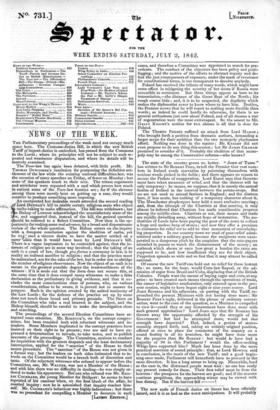NEWS OF THE WEEK.
THE Parliamentary proceedings of the week need not occupy much space here. The Customs-duties Bill, in which the new British Tariff of import-duties is embodied, has passed from the Commons to the Lords ; where its principles will not be subject to such re- peated and wearisome disputation, and where its details will be scarcely examined. The Poor-law has again been debated, with little profit. Mr. THOMAS DUNCOMBE'S resolution for postponing the definitive set- tlement of the law while the existing national difficulties last, was the occasion of many speeches on Friday, of fewer on Monday ; but none of the speakers stuck to their text. The tritest arguments and anecdotes were repeated with a zeal which proves how much in earnest some of the Poor-law fanatics are ; for if the cleverer among them were merely bent on getting up a case, they would contrive to produce something more imposing.
An unexpected but desirable result attended the second reading .af Lord DENMAN'S bill to enable certain religious sects who object oaths-taking to make affirmation. The bill was withdrawn ; but t e Bishop of LONDON acknowledged the unsatisfactory state of the w, and suggested that, instead of the bill, the general question
mild be referred to a Select Committee. Now then is the op- ?ortunity for making some real advance, by a broad and dispassionate review of the whole question. The Bishop enters on the inquiry with a foregone conclusion against the abolition of oaths, yet he ex.1' ssed a sincere desire to have the matter settled on a surer 4-urisis than it would have been by Lord DENMAN'S bill. There is a vague impression to be contended against, that the in- terests of religion are in some way involved ; that the taking of an oath in a court of law, though pro forma a ceremony in law, is in reality an indirect sacrifice to religion ; and that the practice must be maintained, not for the sake of the law, but in order not to abridge the number ofreligious observances. Now the object of an oath is to secure in the greatest possible degree the trustworthiness of the witness : if it is made out that the form does not secure this, at the same time that it does compel many witnesses to make a false declaration as the preliminary to giving evidence, and that it ex- cludes the most conscientious class of persons, who, on various considerations, refuse to be sworn, it is proved not to answer its purpose. Such is the opinion created by the united testimony of the Law Lords ; for the defence of the practice set up by some does not touch those broad and primary grounds. The Peers on the Committee who take a real interest in the subject, and the Bishop himself, should be careful to make the investigation close and searching. The proceedings of the several Election Committees have at- tracted some attention. Mr. ROEBUCK'S, on the corrupt compro- mises, has been troubled both with reluctant witnesses and in- truders. Some Members implicated in the corrupt practices have insisted on their right to be present; two are said to have ex- pressed a determination to intrude, to take notes, and to publish accounts of the proceedings. The Committee, anxious to conduct its inquisition with the greatest despatch and the least declamatory interruption, applied for the "sanction" of the House to their secret procedure. The " sanction " of the House was not given in a formal way ; but the leaders on both sides intimated that to in- trude on the Committee would be a breach both of discretion and taste.Of the reluctant witnesses who refused to appear before the Committee, one, Mr. WALTER, was not a Member of the House ; and with him there was no difficulty in dealing—he was simply or- dered to make his appearance. But one who refused was Mr. Ban- LIE Com:Lass, the young Member for Bridport : he seems to have repented of his candour when, on the first blush of the affair, he courted inquiry : now he is astonished that inquiry reaches him- self. Mr. Cocirearrs's behaviour was highly indecorous ; but there was no precedent for compelling a Member to decorum in such
cases, and therefore a Committee was appointed to search for pre- cedents. The conduct of the objectors has been paltry and petti- fogging; and the motive of the efforts to obstruct inquiry and de- feat the just consequences of exposure, under the mask of reverence for constitutional forms is too transparent to deceive anybody.
Poland has received ;le tribute of many words, which might have some effect in mitigating the severity of her doom if Russia were accessible to sentiment. But three things appear as bars to its transmission,—the distance of the Great Bear of the North ; his rough coarse hide ; and, it is to be suspected, the duplicity which makes the diplomatist never to know where to have him. Besides, the Premier avows that he will resort to nothing more forcible than words; as indeed he could hardly do otherwise for there is no general enthusiasm just now about Poland, and of all dreams a war of regeneration were the most extravagant. So the assent to Mr.
• GAILY KNIGHT'S motion for two ukases is all that is done for Poland.
The Theatre Patents suffered an attack from Lord MAHON ; who brought forth a petition from dramatic authors, demanding a larger scope for their ambition than the two monopoly playhouses afford. Nothing was done in the matter ; Mr. Kim= did not even propose to do any thing this session ; but Sir JAMES GRAHAM promised to consider of it. Probably the abolition of that mono- poly may be among the Conservative reforms—who knows?


























